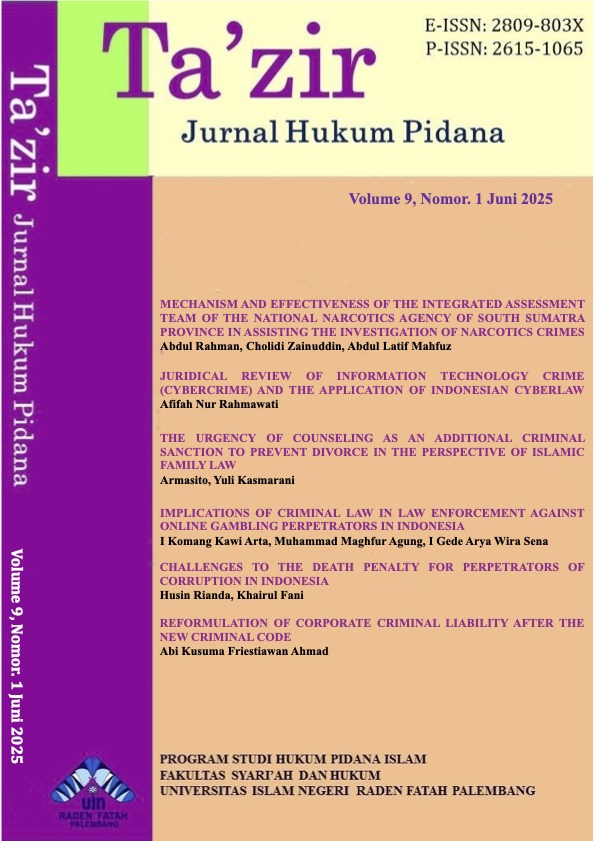IMPLICATIONS OF CRIMINAL LAW IN LAW ENFORCEMENT AGAINST ONLINE GAMBLING PERPETRATORS IN INDONESIA
Main Article Content
Abstract
The development of information technology has encouraged the rise of online gambling practices that are increasingly difficult to control and have a negative impact on the moral, social, and economic of the community. Online gambling is a form of criminal offense that is prohibited by Indonesian law, both in the Criminal Code (KUHP), the Information and Electronic Transactions Law (UU ITE), and the Money Laundering Law (TPPU). Law enforcement against online gamblers includes criminal penalties in the form of imprisonment, fines, and confiscation of assets obtained from gambling proceeds. This study aims to analyze the legal basis and form of criminal responsibility for online gambling perpetrators, as well as highlight the importance of synergy between law enforcement in eradicating this digital crime. With a juridical normative approach, this study shows that the Indonesian legal system has provided a strong foundation to ensnare online gambling perpetrators as a whole, including organizers, players, and parties involved in the flow of gambling funds.
Keywords: Online Gambling, CRIMINAL CODE, ITE LAW, TPPU
Article Details

This work is licensed under a Creative Commons Attribution-ShareAlike 4.0 International License.
Syarat yang harus dipenuhi oleh Penulis sebagai berikut:
Penulis menyimpan hak cipta dan memberikan jurnal hak penerbitan pertama naskah secara simultan dengan lisensi di bawah Creative Commons Attribution License yang mengizinkan orang lain untuk berbagi pekerjaan dengan sebuah pernyataan kepenulisan pekerjaan dan penerbitan awal di jurnal ini.
Penulis bisa memasukkan ke dalam penyusunan kontraktual tambahan terpisah untuk distribusi non ekslusif versi kaya terbitan jurnal (contoh: mempostingnya ke repositori institusional atau menerbitkannya dalam sebuah buku), dengan pengakuan penerbitan awalnya di jurnal ini.
Penulis diizinkan dan didorong untuk mem-posting karya mereka online (contoh: di repositori institusional atau di website mereka) sebelum dan selama proses penyerahan, karena dapat mengarahkan ke pertukaran produktif, seperti halnya sitiran yang lebih awal dan lebih hebat dari karya yang diterbitkan. (Lihat Efek Akses Terbuka).
How to Cite
References
Addiyansyah & Rofiah, "Online Gambling Addiction among Adolescents in West Cilebut Village, Sukaraja District, Bogor Regency, Journal of Communication, Politics and Culture, 1 (1), 13-22.
Coresy, Grace and Saleh, "Liability for Violation of the Principle of Confidentiality in Electronic Deeds When Linked to the Law on Notary Positions and the Law on Information and Electronic Transactions (2020) Rule of Law: Journal of Legal Studies 9(1), 1-11.
Dwi Ayu Kusumowati Masani, 2025, "Beware, the Threat of Online Gambling Under the Guise of Online Games" is available on the website https://rri.co.id/nabire/iptek/1542320/waspada-ancaman-judi-online-berkedok-game-online accessed on May 28, 2025 at 17.22 WITA.
Geraldy Waney, "Legal Studies on the Crime of Gambling (Application of Articles 303, 303 BIS of the Criminal Code)", (2016), Journal of Lex Crimen Vol. V/No.3, 30 - 38
Kanda & Nurdiansyah, 2024, "The Dangers of Online Gambling: Social, Economic, and Health Impacts". Student Scientific Creativity Journal, 4 (1), 1-15.
Muhammad Saputra & Pranoto, "Prevention of Online Gambling Crimes" Journal of Law and Justice 2 (1), 20-30.
Peni Sarijuddin Mappolean, et al, Online Game Activities of Generation Z Based on Islamic Happiness and Welfare Theory in Slot Game Applications , Vol 6 No 3/November/2024, 499
Soerjono Soekanto, 2006, Principles of Legal Sociology, Print 1, Jakarta, PT Raja Grafindo, p. 110.
Suyud Puguh Sunoto, et al., Social Resilience and Social Defense and Their Effects on Drug Abuse in Adolescents: Travis Hirsch's Social Control Theory Perspective, in Published by UI Scholars Hub, 2023, 1-11
Law Number 1 of 1946 concerning the Criminal Code
Law Number 19 of 2016 concerning Information and Electronic Transactions
Law Number 8 of 2010 concerning the Prevention and Eradication of Money Laundering Crimes
